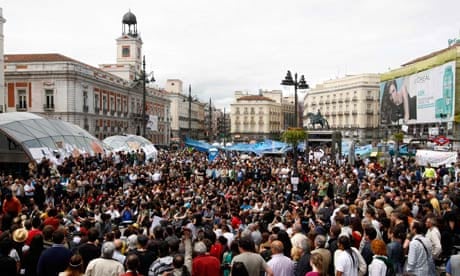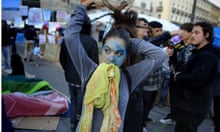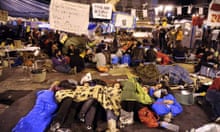A youth-led rebellion is spreading across southern Europe as a new generation of protesters takes possession of squares and parks in cities around Spain, united by a rejection of mainstream politicians and fury over spending cuts.
Protests are also planned in Italy, where the tag #italianrevolution is a trend on Twitter. Plans have been announced for a piazza occupation in Florenceon Thursday night, and for further protests in Italian cities, including Rome and Milan, on Friday.
In Madrid demonstrators have refused to budge from the central Puerta del Sol despite a police charge that dislodged them temporarily on Tuesday night.
Now they have occupied a quarter of the square, covering it with tarpaulins and tents, setting up kitchens, tapping at laptops and settling down to sleep on sofas and armchairs.
Similar scenes were being played out in Barcelona, where protesters held a midday Argentinian-style pan-bashing protest in the Plaza de Catalunya, and in numerous other cities where protesters raised the banner of what they call "the Spanish revolution".
The protests come as Spain prepares to vote for municipal and regional governments, which jointly account for half of spending and most of the welfare state. Town halls and regional governments are expected to increase the pace of spending cuts after Sunday's election as the country battles to rein in its budget deficit and avoid the fate of other eurozone countries such as Portugal, Greece and Ireland that have needed bailouts.
"Everyone is here for their own reasons and with their own proposals," said Luis de Pinedo, 20, an anthropology student who was handing out flyers in the Puerta del Sol explaining that the protesters did not represent any political party. "We are having to pay for an economic crisis that we didn't cause but which was provoked by the banks," he said.
Groups were gathered in debate. About the only demand most could agree on was a change in the electoral law to end the two-party system that shifts power between the socialists of the prime minister, José Luis Rodríguez Zapatero, and the conservative People's party.
"Mostly people are tired of the two-party system," said De Pinedo. "But I am also angry about corruption."
Javier de Coca, a 32-year-old protester in Barcelona, said: "Some people are trying to turn this into a leftwing or Marxist thing, but that is not what it is about. The really important thing for the moment is that we are raising our voices. No one should think we are just sitting around and taking this."
All age groups were present in the protests but the emerging leaders were mostly under 30, part of a generation suffering 45% unemployment. Protesters said they were inspired more by the protests that followed the recent banking crisis in Iceland than by those that have swept through north Africa.
"Spain is not a business. We are not slaves," read one of the hundreds of protest posters glued to the Pueta del Sol's metro station walls.
Demonstrations have been arranged for outside the Spanish embassy in London and in other European cities. "A lot of people have left the country precisely because of the situation we are in," said De Coca. "And they want to protest too."
Police have been instructed to leave the protesters alone.
. Political demonstrations and campaigns are banned on Saturday because of the elections. Zapatero's socialists are facing severe setbacks across the country amid popular anger over 20% unemployment and the spending cuts. There is a general election next March.
Italy so far has not been forced into the sort of austerity measures imposed on Spain, Portugal, Greece and Ireland. But its economy has barely grown in the past 10 years and there is increasing evidence of exasperation with its billionaire prime minister, Silvio Berlusconi.
Over the past two years the Italian government's time has been increasingly devoted to finding ways of dealing with Berlusconi's legal problems. He is a defendant in three trials in which he faces vice charges and a range of accusations relating to his business conduct.
Frustration was evident in the results of partial local and provincial elections held last Sunday and Monday. Berlusconi's candidate for mayor in his home city of Milan, Letizia Moratti, was outstripped by a centre-left contender in the first round of voting, forcing her into a run-off on 29 and 30 May.






